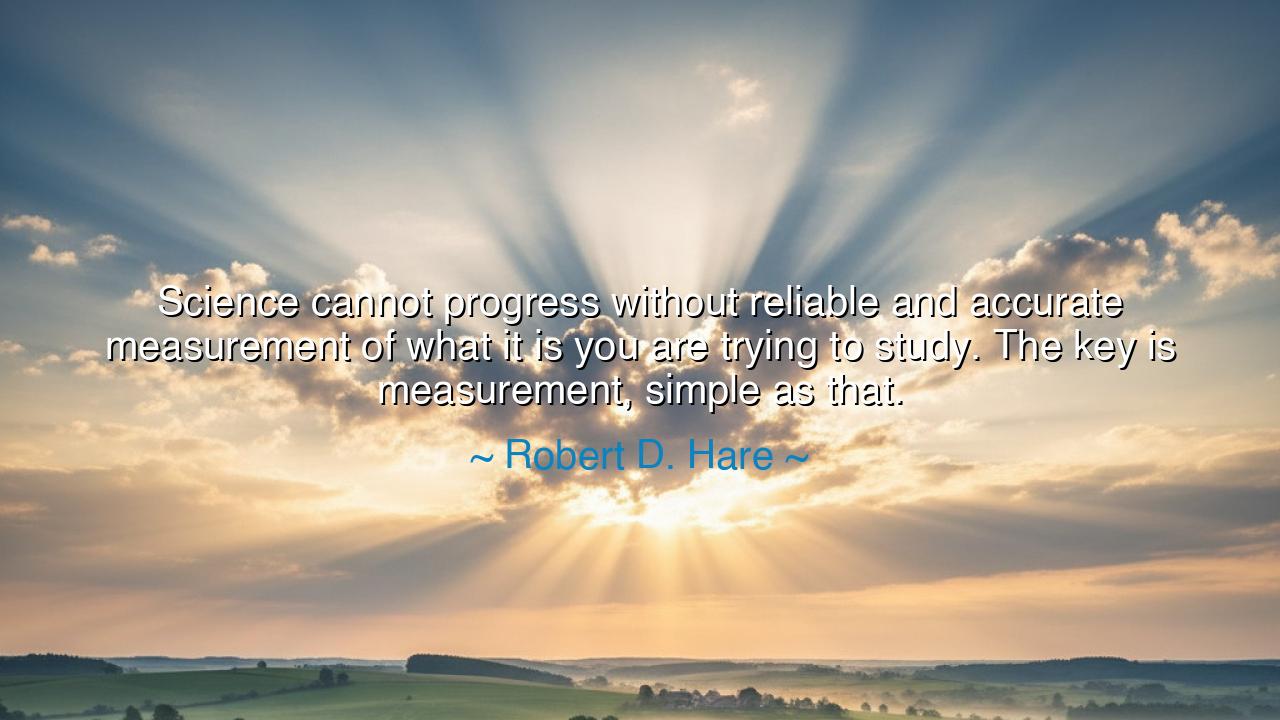
Science cannot progress without reliable and accurate measurement
Science cannot progress without reliable and accurate measurement of what it is you are trying to study. The key is measurement, simple as that.






Hear now, O children of wisdom, the words of Robert D. Hare, who speaks to us a truth that resonates through the ages. "Science cannot progress without reliable and accurate measurement of what it is you are trying to study. The key is measurement, simple as that." These words carry with them a powerful and ancient lesson: the foundation of science rests upon the ability to measure, to quantify, to capture the very essence of what we seek to understand. For science, in its deepest sense, is not just about observing the world, but about capturing it, understanding it in terms that are clear and definitive. It is the measurements we take that form the very building blocks of all scientific knowledge.
Let us turn our gaze, O children, to the ancient world, where early thinkers sought to understand the forces that governed the heavens and the earth. Consider the Babylonians, who first devised the concept of time, measuring the passing of the stars and the cycles of the moon. With their early instruments, they tracked the heavens, but it was not until they learned to measure with precision that their astronomy began to flourish. The great Pythagoras and Euclid sought not just to observe shapes and numbers but to measure them, to give form to their understanding through the rigorous discipline of geometry. It was their ability to quantify the world around them that laid the foundation for the scientific methods that would follow. Without measurement, their discoveries would have remained in the realm of speculation, not yet grounded in the solid soil of truth.
Consider also the tale of Galileo Galilei, who, with his telescope, sought to measure the heavens in a way that had never been done before. Through careful observation and precise measurements, Galileo revealed to the world that the Earth was not the center of the universe, but that the planets revolved around the sun. His discovery was not the result of mere observation, but of measurement, of gathering data that could be tested and verified. In his hands, the stars were not just points of light in the sky, but objects of study and understanding. Galileo’s mastery of measurement allowed him to challenge the prevailing beliefs of his time and to lay the groundwork for the scientific revolution that would change the world forever. Without his ability to measure the movements of the celestial bodies, his insights would have been lost to the sands of time.
The path of science, O children, is shaped by the tools we use to measure the world around us. Hare’s wisdom reminds us that without reliable and accurate measurement, science cannot move forward. Just as Galileo used his telescope to measure the heavens, so too do we use our modern tools—the microscope, the thermometer, the spectrometer—to unlock the mysteries of the world. It is through these instruments of measurement that we can gather data that reveals patterns, relationships, and laws that govern the universe. Each measurement we take is a step closer to understanding the natural world in all its complexity, and it is through these precise measurements that we are able to test our ideas, refine our theories, and prove our hypotheses.
Consider, too, the work of Marie Curie, whose study of radioactivity revolutionized the field of physics and chemistry. Curie’s groundbreaking work was not the product of vague ideas, but of careful, precise measurements of the radiation emitted by certain elements. It was her ability to measure the intensity of radiation and to quantify the effects of these substances that allowed her to discover the phenomenon of radioactivity. Without reliable measurement, her work would have remained speculative, unable to withstand the scrutiny of the scientific community. Curie demonstrated to the world that measurement is not just a means of gathering data, but a tool that enables the discovery of profound truths that shape our understanding of the world.
Thus, O children, the lesson of Hare’s words is clear: measurement is not just a tool of convenience—it is the very key to progress in science. Without measurement, our knowledge remains untested, unfocused, and incomplete. Just as the great minds of the past could only build on the accurate measurements of their predecessors, so too must we measure, test, and refine our understanding of the world. Whether in physics, biology, chemistry, or any other field, it is through measurement that we prove and disprove our ideas, separating truth from error and moving forward in our quest for knowledge.
So, O children, take heed. Let measurement be your guide as you seek to understand the world. In your studies, whether in the sciences or the arts, let the pursuit of truth be rooted in the clarity of data and evidence. Do not be content with vague ideas or speculative musings. Seek to measure, to quantify, to bring certainty to your understanding. For it is only through reliable measurement that we can build a foundation of knowledge that will last for generations, guiding those who come after us to even greater discoveries. Let this truth guide your work, and let it inspire you to continue the noble pursuit of knowledge, grounded in the clear light of scientific measurement.






AAdministratorAdministrator
Welcome, honored guests. Please leave a comment, we will respond soon